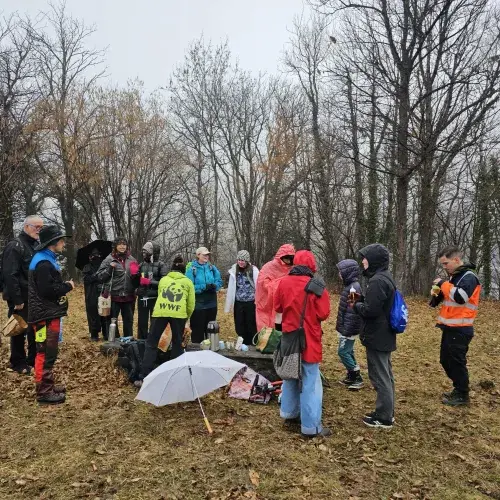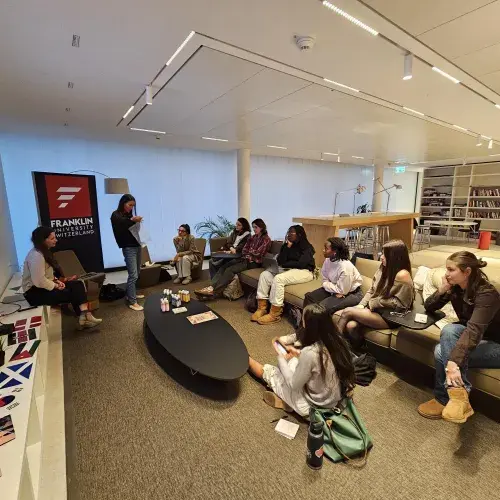The Franklin University Switzerland campus is located in Sorengo, Switzerland, approximately 3 kilometers north of the center of Lugano. The views of the lake and mountains are a reminder of the natural dimension of the university. Situated on a total of 25,000 square meters of hillside land, the campus is bordered by a protected wooded area with a natural water stream and local vegetation. The Green Office seeks future plans to:
- Carry out baseline biodiversity assessments to identify the species and areas of biodiversity importance on land owned or managed by Franklin
- Set specific and measurable goals for nature
- Take action to reduce biodiversity impacts and protect species and ecosystems, while influencing others to do the same
- Conduct transparent biodiversity reporting
In November 2018, thanks in part to the senior gift of the Class of 2018, Franklin installed solar panels to the New Residence A and New Residence B buildings. A total of 152 solar panels were fully installed, leading to the production of about 51,000 kWh per year.
The project was also made possible with the collaboration of the local utility company, AIL. Thanks to the AIL Solar Cloud, Franklin is able to direct overproduction of energy during the summer, which can be subsequently used during the academic year.
Also with the support AIL and funding from the Swiss Federal Office of Energy, Franklin is in the process of constructing a new residence hall that will be the first building in Europe with a mobile photovoltaic system, capable of tracking the position of the sun. Over the course of a day, the solar slats move independently, always positioning themselves in such a way as to make the most of solar radiation. This mechanism makes the building more sustainable from an environmental point of view and, at the same time, offers shading within the interior for greater thermal and lighting comfort. As with the existing solar panels, the excess energy generated from the new project will be directed to the AIL Solar Cloud.
Buildings help serve Franklin’s community by creating sustainable and healthy places for teaching, learning and research, as well as places to socialize, interact and play.
In addition to the solar installments on newer residence halls, the University has opted for eco-friendly options ranging from thermal insulation of the residence halls, to the installation of a thermal heat pump to save energy, to motion activated lights for outside corridors.
In 2021, the University gradually replaced high-consumption light bulbs with low wattage ones, both in the academic/administrative buildings and in some residence halls. Future plans for improving energy efficiency at FUS include additional roof insulation and substituting roof tiles on the main Villa on Kaletsch Campus, and new energy efficient windows in the Villa of Kaletsch Campus.
Franklin actively seeks ways to reduce waste through:
- Recycling. Students, staff and faculty are encouraged to recycle paper, plastic bottles, glass and other materials. Bins for various types of recycling are located throughout the campuses. The addition of municipal recycling points on Franklin’s North Campus in Fall 2023 has enhanced Franklin’s campus recycling infrastructure.
- Engagement. The Green Office organizes programs that promote campus-wide engagement and support a circular economy, such as item and clothing swaps. A student-led composting program in the residence halls is programmed for Spring 2023, as well as a competition between residence halls to reduction energy and water consumption.
- Planning. The Green Office works with student groups to promote sustainable event planning and the reduction of single use food ware.
- Additionally, Franklin is a member of the Sorengo community, which hosts a recycling Eco-centre for residents and provides several resources on recycling and composting on its website. The resources are in the local language of Italian. The Green Office is working on translations to make the information more accessible to the English-speaking population.
- The municipality of Sorengo also uses the Junker app to share recycling and waste disposal information. Instructions on how to download the Junker app can be found here.
At Franklin, our future includes sustainability planning that will extend to our food services, purchasing and procurement principles and sustainable transportation support. We continually work to identify areas for improvement and ways to work as a community to ensure greater sustainability in every aspect of our operation.
Contacts
Email: greenoffice@fus.edu
Instagram: @fus.greenoffice
YouTube: @fus.greenoffice




















